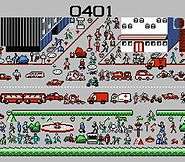Where's Waldo? (video game)
Where's Waldo? (Where's Wally? in the UK, Australia and South America) is a puzzle game developed by Bethesda Softworks and published in 1991 by THQ for the Nintendo Entertainment System. It was the first video game loosely based on Martin Handford's book of the same name. Mostly similar to the books, players must help Waldo get to the moon by finding him in each of the eight levels in the game.
| Where's Waldo? | |
|---|---|
 Cover art | |
| Developer(s) | Bethesda Softworks[1] |
| Publisher(s) | Toy Headquarters/THQ |
| Designer(s) | Paul Coletta, Randy Linden |
| Composer(s) | Julian Lefay |
| Platform(s) | NES |
| Release |
|
| Genre(s) | Puzzle |
| Mode(s) | Single-player |
The game was panned by critics, who criticized the game for its graphics, which made it more difficult to find Waldo in each of the levels.
Gameplay

The player's goal is to help Waldo get to the moon, by finding Waldo in various pictures in order to progress through the game.[2]
There are eight levels in the game. In the picture levels, the directional buttons control a magnifying glass and that must be placed over Waldo in order to "find" him and move to the next level and a new picture. In the easy and practice mode, the pictures are still images the size of the screen in the levels. In the Medium and Hard modes, the player has to scroll to the side to see the rest of the area. Also in the Medium and Hard modes Waldo will change color to make it more challenging to find him in the picture levels.[3]
In the Practice mode, there is no time limit, however only a select number of levels are open (the Train Station, Forest and Caves). The time limit for the other levels varies; On easy, the time limit is ten minutes, on medium, the time limit is seven minutes, and on hard, five minutes. Each time the game is played Waldo is moved to a new location in the scene.[3]
Not all levels in the game have the same format of finding Waldo as in the other levels; in the cave level, the player must find Waldo in the dark. To help, Waldo will pop-up briefly to give a clue where Waldo is.[4] In the subway level, the player must go through a maze and collect Waldo and his dropped glasses in order to exit the stage. The player must also avoid Wizard Whitebeard, who can quickly subtract time if the player lands on his spot.[5] And in the final level, the player must match three pictures of Waldo in order to get Waldo to the moon.[6]
Reception
Responses towards the game from reviewers were negative. One of the most known criticisms of the game is the graphics; some of the pixelated objects in each of the game's levels had similar colors and stripes of Waldo's shirt and in some levels Waldo would even change color, which made it hard to find him. Cracked.com said of Where's Waldo to have the worst graphics of any NES game: "There are many other graphically challenged games that were made, but this game takes the cake."[7]
ConsoleClassix.com said that, although fans of the book may enjoy the game a little, other players may get bored.[8] In an issue of GameInformer, they gave Where's Waldo a 1 out of 10 citing it as being "a game for those too lazy to turn a page." In giving the game an F, writer Cyril Lachel wrote, "It's hard to believe something this pointless came out of Bethesda Softworks... Where's Waldo? Hopefully in a landfill, because that's where this 8-bit piece of garbage belongs."[9] A reviewer of Yahoo! Voices, who gave the game 0.5 out of 5 stars, even criticized the sound effects.[10] Some reviewers also noted of the game's lack of replay value, such as in a review by Gamecola.net.[11]
The game was listed #12 on Seanbaby.com's "Worst Nintendo Games".[12]
Sequel
One year later, a sequel, The Great Waldo Search, was released on the Nintendo Entertainment System, Super Nintendo Entertainment System and Sega Genesis. It was based on Where's Waldo?: The Fantastic Journey, the third book of the Where's Waldo? series. However, in 2009, a more modern remake of that sequel was developed by Ludia and published by Ubisoft on iOS, Microsoft Windows, and seventh-generation Nintendo systems, the Wii and the Nintendo DS. The remake especially takes advantage of superior pointer-based motion controls to easily locate search targets and supports versus multiplayer.
References
Citations
- "Where's Waldo? For NES (1991)".
- Where's Waldo Manual. p. 4.
- Where's Waldo Manual. p. 6.
- Where's Waldo Manual. p. 8.
- Where's Waldo Manual. p. 8-9.
- Where's Waldo Manual. p. 9.
- "Bad Nes Games". Cracked.com. Retrieved July 5, 2012.
- Where's Waldo. ConsoleClassix.com.
- Lachel, Cyril (February 11, 2012). "Where's Waldo review". Defunct Games. Retrieved July 3, 2012.
- Bailey, Eric (August 30, 2010). "Retro Video Game Reviews: Where's Waldo? (NES)". Yahoo! Voices. Archived from the original on January 16, 2014. Retrieved July 3, 2012.
- "Where's Waldo". Gamecola.net.
- "The Worst Nintendo Game #12 - Where's Waldo". Seanbaby.com. Retrieved 4 May 2016.
Bibliography
- Where's Waldo (NES) Manual. THQ. (1991).